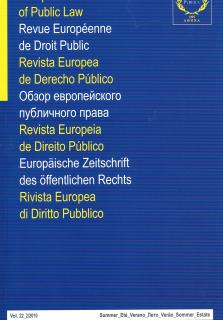
Administrative Law in Europe:
A Historical and Comparative Perspective
Giacinto della Cananea
There is currently a growing interest in the question whether a convergence between the administrative laws of European countries is coming into being and, if so, whether this is desirable or otherwise, as well as whether and to which extent this depends on the broader process of European integration and globalization. This article addresses the question of the limited use of comparative analysis with regard to administrative law, by arguing that it depended on cultural prejudices, the underlying idea being that, unlike private law, administrative law was but a product of each State and its national culture. The article challenges this received idea, by pointing out the importance of transplants and cross-fertilization. It argues, secondly, that administrative law must be considered in a dynamic perspective, and thus focuses on some dynamics of change: the growing importance of public authorities within and outside the Nation-States; the emergence of a common core of general principles of law; the procedural principles that have emerged in national administrative law systems; and finally, the gradual erosion of the areas of immunity. The article expresses, however, a skeptical note with regard to any vision of administrative law that emphasizes progress, arguing that some techniques of administration often regarded as innovative are not at all new. It observes, moreover, that administrative law is still characterized by a fundamental ambivalence between different ideals and forces. The article ends with a brief analysis of some theoretical implications, with specific regard to the importance of comparative analysis.





















